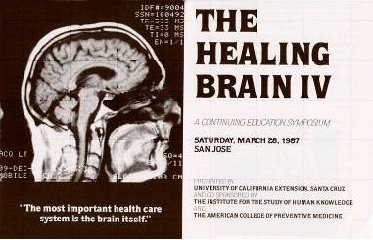Healing Brain Seminar: March 1987
THE HEALING BRAIN IV
A Continuing Education Symposium
Saturday, March 28, 1987
Presented by
UNIVERSITY OF CALIFORNIA EXTENSION, SANTA CRUZ
and Co-sponsored by
THE INSTITUTE FOR THE STUDY OF HUMAN KNOWLEDGE
And THE AMERICAN COLLEGE OF PREVENTIVE MEDICINE

The brain minds the body, and states of health and disease are profoundly influenced by states of mind.
This conference will present some of the recent advances in the brain and behavioral sciences which shed light on the vital role of the brain as a health maintenance organization. Can suggestions given before and during surgery influence postoperative healing and recovery? Can hospital environments be redesigned to foster better emotional states and communication for patients, families and staff? Can conventional cancer treatments be complemented by unconventional therapies to better address the needs of the whole person? Can excessive self-involvement and self-centeredness put people at risk for heart disease? Can a feeling of capability reduce pain and disability from arthritis?
These and other questions of major clinical importance will be explored in a one-day symposium by a distinguished faculty of researchers, teachers and clinicians. They will provide an up-to-date review of some of the emerging trends in behavioral medicine.
FACULTY
HENRY L. BENNETT, Ph.D., is Assistant Adjunct Professor, Department of Anesthesiology, University of California Davis, School of Medicine. For the past five years he has studied the experience of patients before, during and after surgery.
HALSTED R. HOLMAN, M.D., is Professor of Medicine and Director of the Stanford Arthritis Center, Stanford University School of Medicine and the past president of the Midpeninsula Health Service. His research interests have ranged from immunology to health care delivery in communities.
MICHAEL LERNER, Ph.D., is President of Commonweal Health Center in Marin County and a MacArthur Prize Fellow at the Institute for Health Policy Studies at the University of California San Francisco School of Medicine. He has devoted much of the past five years to investigating complementary cancer therapies and is founder of Commonweal Cancer Help Program, a residential group support and education program for motivated cancer patients.
ROSLYN LINDHEIM is Professor of Architecture at the University of California in Berkeley. She has had extensive experience in hospital design and is chairman and architect for the Planetree Model Hospital Project, a highly innovative medical-surgical unit at Pacific Presbyterian Medical Center in San Francisco.
ROBERT ORNSTEIN, Ph.D., is Visiting Professor of Human Biology at Stanford University and President of The Institute for the Study of Human Knowledge. His research interests include the function of the two hemispheres of the brain, perception, and communication in the human sciences. He is author of several books including The Amazing Brain, The Psychology of Consciousness, Psychology: The Study of Human Experience, and the forthcoming book The Healing Brain.
LARRY SCHERWITZ, Ph.D., is Assistant Professor of Social Psychology, Department of Dental Public Health and Hygiene, University of California San Francisco School of Dentistry and Director, Research Psychology, Preventive Medicine Research Institute in San Francisco. His primary research interests have been in investigating psychosocial risk factors and alternative methods for treating coronary heart disease.
Course Coordinator
DAVID S. SOBEL, M.D., is Medical Program Director of The Institute for the Study of Human Knowledge and Director of Patient Education and Health Promotion for the Kaiser Permanente Medical Care Program in Northern California. He is editor of Ways of Health: Holistic Approaches to Ancient and Contemporary Medicine and coauthor of the forthcoming book The Healing Brain.
LECTURES
The Healing Brain: An Introduction
David S. Sobel, M.D.
The Hospital: Creating a Healing Environment
Roslyn Lindheim
Evidence is accumulating on the health-enhancing as well as illness-producing effects of our physical and social environments. Throughout the ages buildings have been constructed in which to care for the sick. These structures reflect the way in which the needs of sick people are viewed. Ways in which the hospital can be reshaped in its physical and social architecture to better serve the human, personal and educational needs of the patient and staff will be illustrated.
Preparing for Surgery: The Use of Physiologically Active Suggestions
Henry L. Bennett, Ph.D.
Many studies show direct benefits to patients from specific types of psychological preparation before surgery and the use of positive suggestion during surgery. What works, what doesn’t and why? The confusion surrounding awareness and consciousness during anesthesia and postoperative effects of suggestions during anesthesia will also be explored.
The Brain Minds the Body
Robert Ornstein, Ph.D.
The brain is composed of many semi-independent systems which contribute to the primary role of the brain-that of keeping the body in a state of health. It does this by constantly maintaining the stability and coherence not only of our internal physiology but of our mental, emotional and social worlds as well.
Psychological Determinants of Outcome in Chronic Arthritis
Halsted R. Holman, M.D.
The conviction that one can be successful in achieving a certain behavior has been called perceived self-efficacy. This vital attitude appears to be as powerful as medications in determining the amount of pain, activity levels, and mental outlook in people with chronic forms of arthritis. Perceived self-efficacy can be positively changed by simple health education practices.
Varieties of Integral Cancer Therapies
Michael Lerner, Ph.D.
Many cancer patients are working with health professionals to develop individual treatment programs which combine a variety of therapies, conventional and unconventional. The wise integration of such therapies can better address the full range of biological and psychological needs of the patient with cancer. The role of emotional factors in the onset of, coping with and recovery from cancer will also be addressed.
Self-Involvement and Coronary Heart Disease Risk
Larry Scherwitz, Ph.D.
Recent research supports the view that self-involvement including selfishness and self-centeredness appear to underlie other recognized risk factors for coronary heart disease such as hostility. Type A behavior, and lack of social support. Ways in which self-involvement can be changed to alter the risk of heart disease will be explored.
